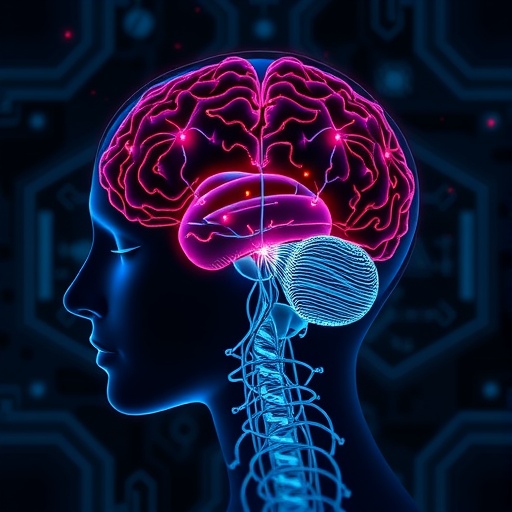In a groundbreaking study that intricately links neurophysiological oscillations with cognitive impairments in mental health, researchers have illuminated how major depressive disorder (MDD) disrupts the brain’s working memory updating system. As mental health conditions continue to affect millions globally, understanding the neurological basis underlying cognitive dysfunction in MDD is critical. This new research, published in BMC Psychiatry, meticulously investigates the neuroelectric oscillatory mechanisms that underpin deficits in working memory—a core cognitive domain often compromised in depression.
Working memory, the brain’s ability to temporarily hold and manipulate information, is essential for everyday functioning. The updating process within working memory is particularly vital, as it allows the brain to constantly refresh the information it processes in real time. Using electroencephalography (EEG), the research team monitored brain activity at specific frequency bands—theta (4–8 Hz), alpha (8–13 Hz), and gamma (30–45 Hz)—to discern how these oscillations differ in individuals with MDD during memory updating tasks.
The study recruited 56 clinically diagnosed MDD patients alongside 43 healthy controls, matched for age and gender. The participants completed a well-validated n-back working memory task, which requires continuous updating and monitoring of stimuli over varying difficulty levels. This experiment considers both 0-back (low load) and 2-back (higher load) conditions, permitting an examination of how cognitive challenge modulates oscillatory brain activity in depressed versus healthy brains.
Behavioral data revealed that the MDD group had significant impairments in working memory performance during the more demanding 2-back task, demonstrated by slower reaction times and reduced accuracy. This was consistent with previous findings highlighting processing speed and executive function deficits in depression, yet the current study specifically connects these deficits to dynamic oscillatory disruptions during memory encoding and updating.
EEG analysis paints a compelling neurophysiological portrait of these cognitive difficulties. The most striking finding was the attenuated parietal theta oscillations in MDD patients during the encoding phase of working memory updating. Theta rhythms in the parietal cortex are widely recognized as neural correlates of cognitive control and memory processing. The reduction of theta power in this region aligns with poorer task performance, suggesting that compromised encoding mechanisms are at the heart of working memory deficits in depression.
Furthermore, this impairment extended beyond parietal cortex activity. Healthy controls exhibited pronounced frontal-midline theta and occipital alpha oscillations during the 2-back challenge, oscillatory patterns believed to support top-down control and sensory inhibition, respectively. Intriguingly, these dynamic oscillatory modulations linked with task difficulty were absent in the MDD cohort, indicating an aberrant neuroelectric response to cognitive load.
Such findings underscore the potential of theta and alpha oscillations as biomarkers for cognitive dysfunction in MDD. The diminished parietal theta and disrupted frontal-midline theta and occipital alpha activities together paint a picture of neural inflexibility, where the brain fails to appropriately adjust its electrophysiological states in response to cognitive demands. This electrophysiological rigidity may contribute to the pervasive cognitive sluggishness experienced by patients with depression.
The implications of this research are multifold. Firstly, it deepens the mechanistic understanding of working memory deficits in major depression, linking observable behavioral impairments to specific neural oscillatory patterns. Secondly, it opens avenues for developing targeted interventions, such as neurofeedback or neuromodulation techniques (e.g., transcranial magnetic stimulation), aimed at restoring healthy oscillatory dynamics to ameliorate cognitive symptoms.
Moreover, given the correlation between weakened parietal theta oscillations and both decreased accuracy and prolonged reaction times, such oscillatory markers could be leveraged for diagnostic or prognostic purposes. Tracking these neural signatures might help clinicians quantify cognitive impairment severity or monitor treatment efficacy in real time.
This study also stresses the importance of focusing on the memory encoding phase when exploring cognitive dysfunction in psychiatric disorders. While much research has concentrated on retrieval processes or global cognitive decline, the subtle disruptions in the initial stages of working memory updating appear pivotal in MDD, revealing a more nuanced pathology than previously appreciated.
In conclusion, this innovative work reveals that major depressive disorder is characterized by distinct alterations in theta and alpha rhythm patterns during working memory updating tasks. These alterations reflect impaired neural encoding processes and abnormal cortical responses to cognitive load, constituting a neurophysiological basis for the functional cognitive deficits observed in depression. By advancing our comprehension of these neural dynamics, such research paves the way for more precise and biologically grounded therapeutic strategies, marking a significant leap forward in the neuroscience of mood disorders.
Subject of Research: Working memory updating deficits and their neurophysiological markers in major depressive disorder.
Article Title: Major depressive disorder is characterized by differential theta and alpha patterns during working memory updating.
Article References:
Tang, H., Wang, X., Lu, Q. et al. Major depressive disorder is characterized by differential theta and alpha patterns during working memory updating. BMC Psychiatry 25, 923 (2025). https://doi.org/10.1186/s12888-025-07180-w
Image Credits: AI Generated




